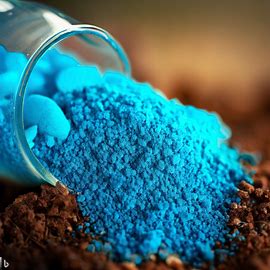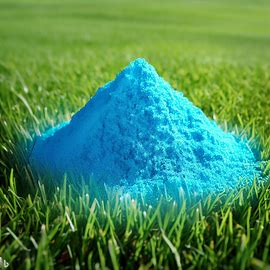In the green world of gardening, copper sulfate often hogs the limelight as a quick fix solution to all things fungal. But did you know there’s much more to this popular pesticide than meets the eye? It turns out this versatile compound might just have a secret alter ego – grass assassin!
As garden enthusiasts, we’ve often reached for that trusty blue powder without giving it a second thought. Copper sulfate; so reliable against blights and molds, but can it really wage war on our lush lawns too? The answer may surprise you!
So hold onto your gardening gloves as we delve deeper into this peculiar paradox. Will copper sulfate emerge as the unexpected villain in our grass-growth saga or will its reputational standing spring back with some help from science? Stick around to find out!
Effects of Copper Sulfate on Grass Growth

Copper sulfate is a commonly used herbicide that can have varying effects on grass growth depending on its concentration.
When used in high concentrations, copper sulfate can be detrimental to grass and other plants, inhibiting their growth and eventually causing them to die off.
This is because copper ions, which are present in copper sulfate, can interfere with important metabolic processes within plants.
However, when used in lower concentrations or as directed by the product label, copper sulfate should not cause significant harm to grass. It may temporarily stunt the growth of grass blades but will typically not kill the entire plant.
In fact, some studies suggest that using small amounts of copper sulfate can even improve nutrient uptake in grasses and promote healthier growth.
Analyzing Copper Sulfate’s Impact at Different Concentrations
The key factor determining whether copper sulfate will kill grass lies in its concentration. Higher concentrations of this chemical compound have stronger herbicidal properties and are more likely to harm plants like grass.
On the other hand, lower concentrations are generally safer for use around vegetation.
To better understand how different concentrations affect plants’ health and survival rate when exposed to copper sulfate applications, researchers conducted various experiments under controlled conditions.
These studies found that while high concentrations (>100 ppm) led to complete plant death after repeated exposure over time (usually several weeks), low concentrations (<50 ppm) had minimal impact on most types of grass.
It’s crucial to note that these findings may vary depending on factors such as soil composition and species-specific tolerance levels; hence it’s always recommended to follow the guidelines provided by manufacturers or seek professional advice before applying any herbicides.
Copper Sulfate as a Selective Herbicide: Efficacy and Limitations

Copper sulfate is considered a selective herbicide, meaning it primarily targets broadleaf plants while having fewer effects on grasses.
This characteristic makes copper sulfate particularly useful in eliminating unwanted growth without harming desired grass species.
However, it’s important to note that although copper sulfate can selectively target certain plants, this selectivity varies depending on factors such as application method, timing, and specific plant species present in the area.
Therefore, caution should be exercised when applying copper sulfate near sensitive or desirable grass species to avoid unintended harm.
Possible Environmental Consequences of Using Copper Sulfate on Lawns
While copper sulfate can effectively control weed growth in lawns, its use may have potential environmental consequences. Copper is a heavy metal that can accumulate in soil over time and pose risks to both terrestrial and aquatic ecosystems.
Excessive use of copper sulfate or improper disposal of treated materials can lead to increased concentrations of copper in surrounding soil and water sources.
This elevated amount of copper may then negatively impact beneficial microorganisms present in the soil and potentially leach into nearby streams or groundwater systems.
To minimize these potential environmental consequences, it is essential to follow recommended application rates provided by manufacturers diligently. Additionally, avoiding runoff into storm drains or bodies of water through careful application practices will help reduce the risk of contamination.
Alternatives to Using Copper Sulfate for Weed Control in Grass

For those concerned about using copper sulfate as a herbicide due to its potential environmental impacts or limited effectiveness against certain weeds, there are alternative methods worth exploring:
1. Manual Weed Removal: Simple hand-pulling or digging up weeds at their roots can be an effective way to eliminate undesirable growth without relying on chemical treatments.
2. Organic Herbicides: There are several organic herbicides available that contain ingredients like acetic acid (vinegar) or citric acid derived from citrus fruits. These alternatives are often considered safer for the environment while still providing effective weed control.
3. Mulching: Applying a layer of organic mulch around emerging weeds can prevent them from receiving sunlight and inhibit their growth. This method not only controls weed development but also helps retain soil moisture and regulate temperature.
The Role of Soil pH in Mediating the Effects of Copper Sulfates on Plants
The pH level of the soil plays a significant role in mediating the effects copper sulfate has on plants, including grass species. Acidic soils (pH < 7) tend to increase the availability and mobility of copper ions, making it more likely for plants to absorb higher doses of copper sulfate.
On the other hand, alkaline soils (pH > 7) bind with copper ions, reducing their availability for plant uptake and potentially minimizing any adverse effects caused by excess exposure.
Therefore, understanding your soil’s pH level before using copper sulfate as a herbicide is crucial. Conducting a soil test can provide valuable information about its composition and help determine appropriate application rates based on specific needs.
Assessing Safety Measures When Applying Copper Sulfates to Target Weeds
To ensure safe usage when applying copper sulfates as an herbicide in lawn care:
1. Follow Product Instructions
Always read and adhere to product labels or manufacturer instructions carefully before use. These guidelines provide essential information regarding proper mixing ratios, application methods, safety precautions, and recommended protective gear.
2. Wear Protective Clothing
When handling herbicides like copper sulfate solutions, wearing protective clothing such as gloves, goggles, or safety glasses, long-sleeved shirts, and long pants tucked into boots or socks is imperative to prevent skin contact or accidental ingestion.
3. Minimize Spray Drift
Calibrating spray equipment correctly can help minimize off-target drift during application processes – limiting potential harm to desirable grass or neighboring plants. Also, avoid spraying on windy days to prevent herbicide particles from spreading unintentionally.
4. Store and Dispose Properly
After use, store copper sulfate products in their original containers in a secure area away from children, pets, and food sources. Any unused solution or empty containers should be disposed of properly following local regulations to prevent environmental contamination.
Conclusion
Well now, so will copper sulfate kill grass? When used correctly at appropriate concentrations, copper sulfate can effectively control unwanted weeds without causing significant harm to grass species.
Adopting alternative weed control methods can also provide safer options for those concerned about potential environmental impacts associated with copper sulfate usage.
Always prioritize safety measures when working with any herbicides and follow recommended guidelines provided by manufacturers or professionals in order to safely eliminate unwanted growth while maintaining the health of your lawn.





